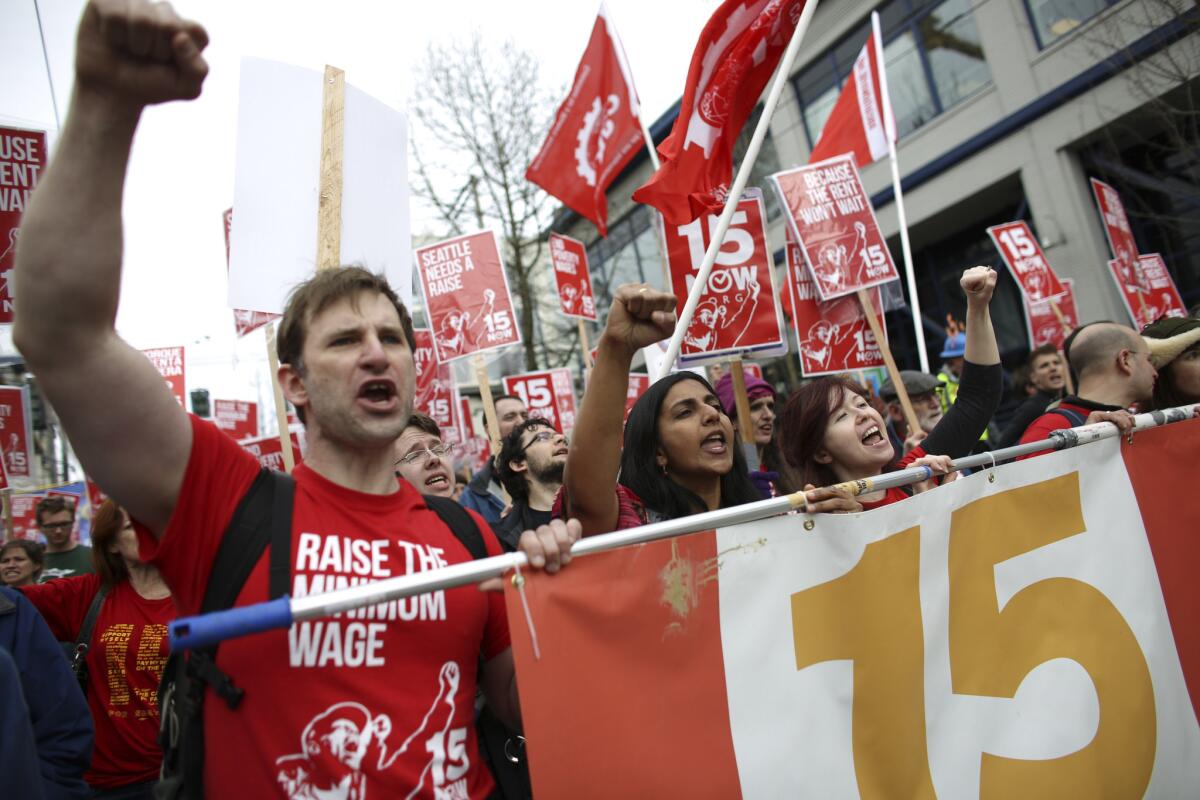Op-Ed: A local approach to bigger paychecks

- Share via
Many cities are pricey places to live. Acknowledging that reality, a growing number of cities have adopted higher minimum-wage standards than those set by the federal and state governments. San Francisco is on that list, as are San Jose, Seattle (where efforts are underway to raise the hourly minimum to $15), Washington (and two adjacent Maryland counties), Albuquerque and Santa Fe, N.M. Even in San Diego, no bastion of liberalism, the City Council is moving to put a wage hike before local voters.
One city is conspicuously, and bewilderingly, absent from this list: Los Angeles. L.A., after all, is the cradle of municipal policies and movements that have improved the lot of the working poor over the last two decades. It was the Los Angeles Alliance for a New Economy that pioneered living-wage ordinances and local hiring agreements that have raised incomes for workers on projects receiving local governmental assistance and brought jobs to inner-city residents — innovations that more than 125 other cities have copied. Creative campaigns by L.A.-based unions of janitors and hotel workers won wage hikes and benefits for historically exploited workers, and inspired workers in other cities to do likewise.
It’s surprising, then, that Los Angeles has not yet seen a campaign to adopt a citywide minimum wage for the more than 800,000 city residents — 46% of working Angelenos — who make less than $15 an hour. That comes to less than $30,000 for year-round full-time work.
That amount of money doesn’t go very far in Los Angeles, where the average monthly rent for a two-bedroom apartment is $1,523. A family needs to earn $29.29 an hour to afford that rent, according to the Southern California Assn. for Non-Profit Housing. At the current state minimum wage of $8 an hour, two minimum-wage workers would each have to work 73 hours a week to afford that apartment.
Worse yet, wages are going down in Los Angeles even as the cost of living rises. Between 1979 and 2011, the median inflation-adjusted pay of L.A. workers declined by 14%. For the working poor — the bottom quarter of income earners — yearly pay plummeted by 26%.
Where, then, is the City Council? Where’s the mayor?
Are they concerned that some business leaders will warn that adopting a citywide minimum wage could kill jobs and hurt the economy? In fact, raising the local wage would pour more money into the economy and improve the business climate. If L.A. set a minimum wage of $15 an hour, according to a study last year from the Economic Roundtable, it would boost sales in L.A. County by an estimated $9.2 billion. A $15-citywide minimum wage would so increase local purchasing power that it would create nearly 65,000 jobs countywide, the Economic Roundtable concluded.
The vast majority of low-wage local workers are employed in retail stores, hotels, restaurants, hospitals and nursing homes — businesses that can’t relocate to Texas, Mexico or China. (That’s one reason a proposal before the City Council to raise the wages of employees of large hotels to $15 an hour — an idea that has garnered support from business leaders Rick Caruso and Eli Broad — should be passed forthwith.)
For those who nonetheless fear that these businesses will move from L.A. to Glendale or Culver City, there’s a simple solution: Under California law, counties have authority to set minimum-wage standards too. The minimum wage for manufacturing firms, which might move their factories to lower-wage regions, could be set at a somewhat lower level, as could the wage for employers with five or fewer workers.
Adopting a local minimum wage would pose little political risk for L.A.’s elected officials. Polls show bipartisan backing for raising the national minimum wage, and in cities, support for a higher minimum is even greater. This month, 87% of Chicago voters approved an advisory ballot measure calling for a $15-an-hour minimum.
Since the early 1990s, when the end of the Cold War led to the decline of the local aerospace industry, Los Angeles has been transformed from a middle-class metropolis to the capital of low-wage work. During the same period, community and civic groups have successfully pushed elected officials to enact policies to help low-wage workers, with the single exception of the one policy that would help them most: adopting a citywide — or a countywide — minimum wage. As economic inequality becomes the defining issue of our time, this is a cause that L.A.’s elected officials, worker advocates and all people of conscience surely should embrace.
Peter Dreier is chairman of the Urban and Environmental Policy Department at Occidental College and the author of “The 100 Greatest Americans: A Social Justice Hall of Fame.” Harold Meyerson is editor at large of the American Prospect and an op-ed columnist for the Washington Post.
More to Read
A cure for the common opinion
Get thought-provoking perspectives with our weekly newsletter.
You may occasionally receive promotional content from the Los Angeles Times.









